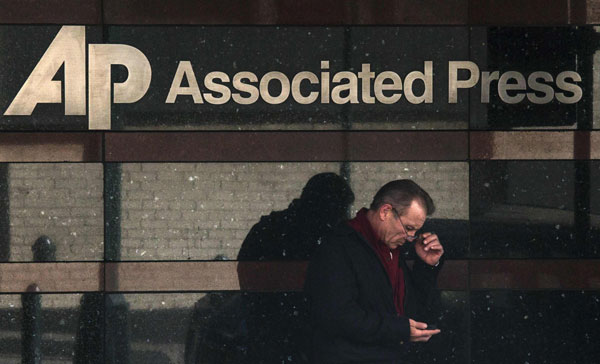AP says US govt seized journalists' phone records
Updated: 2013-05-14 11:13
(Agencies)
|
||||||||
 |
|
A man looks down at his smartphone as he walks past the offices of the Associated Press in Manhattan, New York May 13, 2013. [Photo/Agencies] |
WASHINGTON - The Associated Press said on Monday the US government secretly seized telephone records of AP offices and reporters for a two-month period in 2012, describing the acts as a "massive and unprecedented intrusion" into news-gathering operations.
AP Chief Executive Gary Pruitt, in a letter posted on the agency's website, said the AP was informed last Friday that the Justice Department gathered records for more than 20 phone lines assigned to the news agency and its reporters.
"There can be no possible justification for such an overbroad collection of the telephone communications of The Associated Press and its reporters," Pruitt said in the letter addressed to Attorney General Eric Holder.
An AP story on the records seizure said the government would not say why it sought them.
But it noted that US officials have previously said the US Attorney's Office in the District of Columbia was conducting a criminal investigation into information contained in a May 7, 2012, AP story about a CIA operation in Yemen that stopped an al Qaeda plot to detonate a bomb on an airplane headed for the United States.
Five reporters and an editor involved in that story were among those whose phone numbers were obtained by the government, the AP said.
The disclosure threatened to set off a confrontation between free press advocates and the Obama administration, which has aggressively pursued national security leaks.
"It's alarming given the scale of it," said David Schulz, an attorney with Levine Sullivan Koch & Schulz who is representing the AP. "This is a massive intrusion into the news gathering operation of one of the largest news organizations in the US People should be concerned."
The US Attorney's Office in the District of Columbia, which notified the AP of the seizure, issued a statement on Monday saying it was "careful and deliberative" when dealing with issues around freedom of the press.
"We take seriously our obligations to follow all applicable laws, federal regulations, and Department of Justice policies when issuing subpoenas for phone records of media organizations," the office said.
A Justice Department spokesman referred inquires to the US Attorney's Office.
The White House was not involved in the decision to seize the AP records, Press Secretary Jay Carney said.
"Other than press reports, we have no knowledge of any attempt by the Justice Department to seek phone records of the AP," Carney said. "We are not involved in decisions made in connection with criminal investigations, as those matters are handled independently by the Justice Department."
The seized phone records were for April and May of 2012, and AP bureaus in New York, Hartford and Washington were among those affected, as well as an AP phone at the US House of Representatives press gallery, the AP said.
AP journalists' home and cell phone records were seized by the Justice Department, Pruitt said in his letter to Holder.
The reporters who were targeted included Matt Apuzzo, Adam Goldman and Eileen Sullivan, who were also part of a team that won the Pulitzer Prize for revealing secret New York Police Department intelligence operations targeting Muslim communities.
The AP said it had delayed reporting the Yemen plot story at the request of government officials and disclosed it after officials said it no longer endangered national security.
CIA Director John Brennan in testimony in February said the FBI had questioned him but he denied being the AP's source.
Reuters reported that on May 7, 2012, Brennan, then Obama's top White House counterterrorism adviser, held a small, private teleconference to brief former counter-terrorism advisers who are frequent commentators on television news shows and told them that the plot was never a threat to US public safety because Washington had "inside control" over it.
The original AP story made no mention of an undercover informant or "control" over the operation by the United States or its allies.

 Michelle lays roses at site along Berlin Wall
Michelle lays roses at site along Berlin Wall
 Historic space lecture in Tiangong-1 commences
Historic space lecture in Tiangong-1 commences
 'Sopranos' Star James Gandolfini dead at 51
'Sopranos' Star James Gandolfini dead at 51
 UN: Number of refugees hits 18-year high
UN: Number of refugees hits 18-year high
 Slide: Jet exercises from aircraft carrier
Slide: Jet exercises from aircraft carrier
 Talks establish fishery hotline
Talks establish fishery hotline
 Foreign buyers eye Chinese drones
Foreign buyers eye Chinese drones
 UN chief hails China's peacekeepers
UN chief hails China's peacekeepers
Most Viewed
Editor's Picks

|

|

|

|

|

|
Today's Top News
Shenzhou X astronaut gives lecture today
US told to reassess duties on Chinese paper
Chinese seek greater share of satellite market
Russia rejects Obama's nuke cut proposal
US immigration bill sees Senate breakthrough
Brazilian cities revoke fare hikes
Moody's warns on China's local govt debt
Air quality in major cities drops in May
US Weekly

|

|








